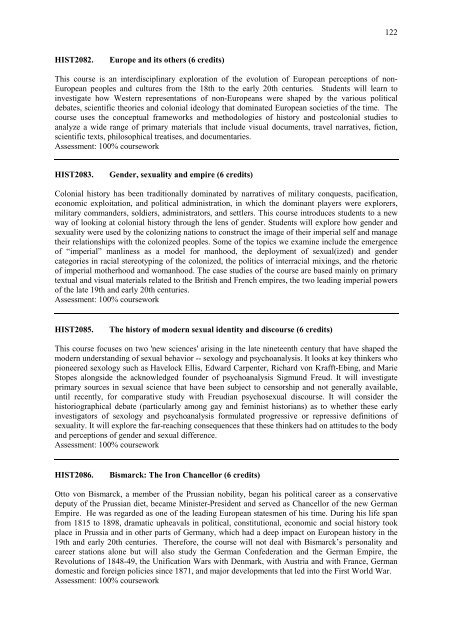(BA) (4-year-programme) - The University of Hong Kong
(BA) (4-year-programme) - The University of Hong Kong
(BA) (4-year-programme) - The University of Hong Kong
Create successful ePaper yourself
Turn your PDF publications into a flip-book with our unique Google optimized e-Paper software.
122HIST2082.Europe and its others (6 credits)This course is an interdisciplinary exploration <strong>of</strong> the evolution <strong>of</strong> European perceptions <strong>of</strong> non-European peoples and cultures from the 18th to the early 20th centuries. Students will learn toinvestigate how Western representations <strong>of</strong> non-Europeans were shaped by the various politicaldebates, scientific theories and colonial ideology that dominated European societies <strong>of</strong> the time. <strong>The</strong>course uses the conceptual frameworks and methodologies <strong>of</strong> history and postcolonial studies toanalyze a wide range <strong>of</strong> primary materials that include visual documents, travel narratives, fiction,scientific texts, philosophical treatises, and documentaries.Assessment: 100% courseworkHIST2083.Gender, sexuality and empire (6 credits)Colonial history has been traditionally dominated by narratives <strong>of</strong> military conquests, pacification,economic exploitation, and political administration, in which the dominant players were explorers,military commanders, soldiers, administrators, and settlers. This course introduces students to a newway <strong>of</strong> looking at colonial history through the lens <strong>of</strong> gender. Students will explore how gender andsexuality were used by the colonizing nations to construct the image <strong>of</strong> their imperial self and managetheir relationships with the colonized peoples. Some <strong>of</strong> the topics we examine include the emergence<strong>of</strong> “imperial” manliness as a model for manhood, the deployment <strong>of</strong> sexual(ized) and gendercategories in racial stereotyping <strong>of</strong> the colonized, the politics <strong>of</strong> interracial mixings, and the rhetoric<strong>of</strong> imperial motherhood and womanhood. <strong>The</strong> case studies <strong>of</strong> the course are based mainly on primarytextual and visual materials related to the British and French empires, the two leading imperial powers<strong>of</strong> the late 19th and early 20th centuries.Assessment: 100% courseworkHIST2085.<strong>The</strong> history <strong>of</strong> modern sexual identity and discourse (6 credits)This course focuses on two 'new sciences' arising in the late nineteenth century that have shaped themodern understanding <strong>of</strong> sexual behavior -- sexology and psychoanalysis. It looks at key thinkers whopioneered sexology such as Havelock Ellis, Edward Carpenter, Richard von Krafft-Ebing, and MarieStopes alongside the acknowledged founder <strong>of</strong> psychoanalysis Sigmund Freud. It will investigateprimary sources in sexual science that have been subject to censorship and not generally available,until recently, for comparative study with Freudian psychosexual discourse. It will consider thehistoriographical debate (particularly among gay and feminist historians) as to whether these earlyinvestigators <strong>of</strong> sexology and psychoanalysis formulated progressive or repressive definitions <strong>of</strong>sexuality. It will explore the far-reaching consequences that these thinkers had on attitudes to the bodyand perceptions <strong>of</strong> gender and sexual difference.Assessment: 100% courseworkHIST2086.Bismarck: <strong>The</strong> Iron Chancellor (6 credits)Otto von Bismarck, a member <strong>of</strong> the Prussian nobility, began his political career as a conservativedeputy <strong>of</strong> the Prussian diet, became Minister-President and served as Chancellor <strong>of</strong> the new GermanEmpire. He was regarded as one <strong>of</strong> the leading European statesmen <strong>of</strong> his time. During his life spanfrom 1815 to 1898, dramatic upheavals in political, constitutional, economic and social history tookplace in Prussia and in other parts <strong>of</strong> Germany, which had a deep impact on European history in the19th and early 20th centuries. <strong>The</strong>refore, the course will not deal with Bismarck’s personality andcareer stations alone but will also study the German Confederation and the German Empire, theRevolutions <strong>of</strong> 1848-49, the Unification Wars with Denmark, with Austria and with France, Germandomestic and foreign policies since 1871, and major developments that led into the First World War.Assessment: 100% coursework
















